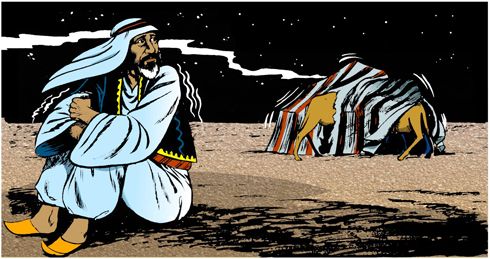第616期:滑坡悖论和骆驼的鼻子有什么关系? SSA and Camel’s Nose
昨天我们聊了世界上最陡的街道——纽西兰但尼丁市的鲍德温大街(Baldwin Street)和那里每年举办的一些慈善活动。
想象一下,如果在一个下雪的冬天,你在Baldwin Street的坡顶滚下一个小雪球,会发生什么?
这个小雪球一路滚下去,最后会变成一个巨大的雪球,对吧?
这个现象在心理学中叫作雪球效应(snowball effect),意思大家都懂 —— 一个很小的事情可能会变成很大的事情;一个很小的错误可能会最终酿成大祸。
英语中有一个谚语 The camel’s nose in the tent 表达的也是这个意思。(* tent — 帐篷)
怎么回事呢?这是一个古老的阿拉伯寓言故事。

One cold night, as an Arab sat in his tent, a camel gently thrust his nose under the flap and looked in.
“Master,” he said, “let me put my nose in your tent. It’s cold and stormy out here.”
“By all means,” said the Arab, “and welcome” as he turned over and went to sleep.
A little later the Arab awoke to find that the camel had not only put his nose in the tent but his head and neck also.
The camel, who had been turning his head from side to side, said, “I will take but little more room if I place my forelegs within the tent. It is difficult standing out here.”
“Yes, you may put your forelegs within,” said the Arab, moving a little to make room, for the tent was small.
Finally, the camel said, “May I not stand wholly inside? I keep the tent open by standing as I do.”
“Yes, yes,” said the Arab. “Come wholly inside. Perhaps it will be better for both of us.”
So the camel crowded in.
The Arab with difficulty in the crowded quarters again went to sleep.
When he woke up the next time, he was outside in the cold and the camel had the tent to himself.
一个寒冷的冬夜,一头骆驼恳求一个阿拉伯人让它把鼻子伸进他的帐篷里取暖。
阿拉伯人同意了。
一会儿,骆驼说让我把两条前腿也伸进帐篷里吧外面太冷了。
阿拉伯人又同意了。
最后,骆驼整个身体都钻进帐篷里了,那个阿拉伯人反而被挤出了帐篷。

这个寓言的寓意是:
A small, seemingly innocuous act or decision that will lead to much larger, more serious, and less desirable consequences down the line.
一个看似无害、无关紧要的小决定,最终可能会导致巨大的严重的损失。
所以英语里说 Do not allow a camel to put his nose under the edge of your tent, for soon you will have a camel in your tent.
Camel’s nose在英语中的意思就是:A situation where the permitting of some small act will lead to a larger undesirable act or circumstance.
我们来看个例句体会一下camel’s nose在实际中怎么用。
Some regard legalizing same-sex marriage as a camel’s nose under the tent, eventually leading to the destruction of marriage altogether.
有人认为同性婚姻合法化就像帐篷里的骆驼的鼻子一样,最终会导致婚姻的整体毁灭。
你说 camel’s nose,英美人就知道你的意思了。有点像汉语中“千里之堤溃于蚁“的意思。
但是,问题来了。
上面这个例句中表达的这个逻辑是不是有道理呢?
同性婚姻合法化会导致人类婚姻制度的最终崩溃吗?
这个推理看似有道理,其实是个逻辑悖论(logical fallacy)—— 在心理学中称为 Slippery Slope Fallacy “滑坡悖论”或“滑坡谬误”,也叫 Slippery Slope Argument (SSA),是一个复杂的逻辑学问题。
*谬误(Fallacy)指有缺陷的推理。
简单地说,滑坡悖论认为:
If A, then B;
if B, then C;
If C, then D.

这个逻辑之所以是一个fallacy,有缺陷,是因为其推理过程过分简单化了、理想化了,完全忽略了从因到果之间过程中其他的可能性和变数。
再拿上面那个同性婚姻的例句为例,用 slippery slope的逻辑来推论的话,后果不仅是人类婚姻制度的解体,而是比这更可怕。
If we allow gay marriage, the next thing we know, people will want to marry their dogs, or their cats, or what about their pigs?
如果今天我们允许同性恋婚姻,以后人们是不是会跟他们的狗和猫结婚呢?甚至跟猪?
你感觉到这个逻辑推理的缺陷了吗?
从同性恋婚姻到人和猫狗结婚这个过程跨越太大了,完全没有逻辑上的因果关系。但猛一听乍一看好像有点道理,达到吓阻人们做某事的目的。
因此slippery slope argument(SSA)被称为 negative reasoning 负面推理。
再例如:
If we give in every time our baby cries, he will always pitch a fit to
get what he wants, and he will end up in prison because we never set
limits.
如果你的孩子一哭你就屈服,孩子就会得寸进尺,最后他就会进监狱,因为你一直没给孩子设定一个限度。
这就是slippery slope argument的荒谬。
同样的道理,如果一所大学的学生因对学校食堂的饭菜不满,集体罢吃食堂以示抗议。校长说学校绝不能让步,因为这次因为食堂的事向学生让了步,下次他们可能会提出更多的要求。这样下去,学校最终将关门。
*这是佛老学生时代发生的真实事件。
这位校长的脑子里就是 slippery slope argument。可悲的是,类似的事今天仍在世界上发生着。
滑坡谬误仍在左右着很多人的思维,坚决不承认自己的错误,不肯让步。宁愿事情越来越糟也不愿意放下身段听听不吃食堂的学生们的意见,或者亲自去食堂吃一顿。
在佛老经历的那起罢吃食堂事件中,老校长最终在一个月后把负责学生食堂的人(校长的小舅子)撤换了,公开招标,选了一家校外的餐饮公司来经营食堂。
之后再也没人抱怨过食堂,学校也没有因此关门。
我们和食堂和老校长 lived happily ever after.
推荐阅读:





